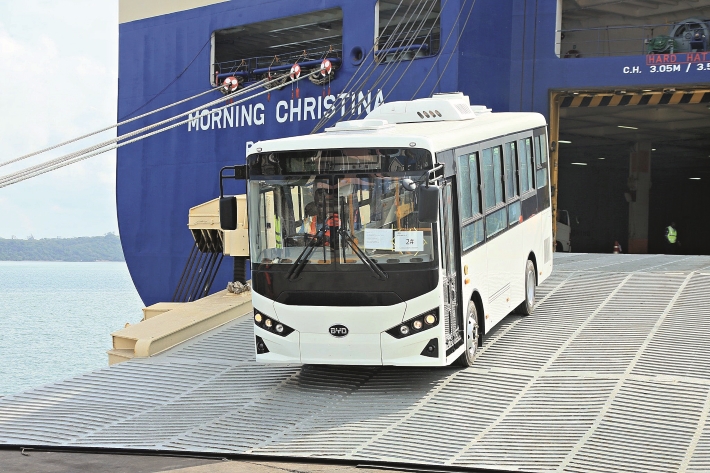|
||||||||||
| Home Nation World Business Opinion Lifestyle ChinAfrica Multimedia Columnists Documents Special Reports |
|
||||||||||
| Home Nation World Business Opinion Lifestyle ChinAfrica Multimedia Columnists Documents Special Reports |
| ChinAfrica |
| Fruitful Transition |
| Africa can reap unprecedented environmental and economic benefits from transition to e-mobility |
| By Dr. Christian Sekomo Birame | VOL. 16 June 2024 ·2024-06-11 |

Dr. Christian Sekomo Birame (COURTESY)
Over the years, a African continent has been importing used gasoline and diesel vehicles including ones that are 10 years old. Such vehicles emit carbon dioxide, which is the leading cause of greenhouse gases (GHGs) that are driving the climate change.
In Rwanda, for example, road transport contributes to 13 percent of the country’s greenhouse emissions, according to the Rwanda Environment Management Authority (REMA). Africa as a developing continent continues to pollute air, partly due to the use of second-hand cars from developed countries.
According to the UN Environment Programme (UNEP), road transport sector is the fastest-growing GHG emitting sector and is expected to account for more than 30 percent of total GHG emissions in the future if nothing is done to reverse the trend.
The effect of these emissions goes beyond harming the environment. They also affect human health and cause thousands of deaths annually. This underscores the urgency to shift from the traditional gasoline-powered vehicles to new energy vehicles (NEVs), of which pure electric vehicles (EVs) are a dominant variant.
Embracing a green revolution will undoubtedly improve road transport, prevent GHG emissions and improve the quality of air that we breathe. NEVs offer a cleaner alternative, reducing emissions and improving public health. This aligns with the growing focus on creating liveable cities and improving public health across the continent.
Multiple benefits
African governments recognise the environmental and economic benefits of NEVs. Many African countries rely heavily on imported fossil fuels, making them vulnerable to price fluctuations and supply disruptions. NEVs offer a path towards energy independence by reducing reliance on oil. This is particularly important considering Africa’s abundant solar and wind resources, which can be harnessed to generate clean electricity for powering NEVs. It is estimated that Rwanda could save over $22 million annually in fuel imports for motorcycles alone if it transitions to e-mobility.
African countries like Rwanda, Kenya, Ethiopia, Togo, Uganda, Burundi, and Madagascar as well as Sierra Leone are working together with the UN Environment Programme and Global Fuel Economy Initiative on policies for the introduction and shift to NEVs.
On economic development, the NEV sector presents an opportunity for economic diversification and job creation in Africa. Local assembly plants for NEVs can create new employment opportunities, while the development of charging infrastructure requires investments in grid upgrades and renewable energy sources. This will foster economic growth and technological advancement across the continent.
The environmental benefits of NEVs are undeniable. Transportation is a major contributor to climate change. According to the International Energy Agency, electric buses can achieve a significant reduction in GHG emissions compared to traditional diesel buses.
NEVs produce zero tailpipe emissions, significantly reducing air pollution levels in urban areas. This translates into improved public health, with fewer respiratory illnesses and a lower incidence of heart disease. Studies by the World Health Organization highlight the devastating impact of air pollution on health, making NEVs a critical tool for improving public well-being in Africa.

A BYD electric bus is being unloaded at the Port of Mombasa, Kenya, in November 2022 (KENYA PORTS AUTHORITY)
Chinese investment
Of course, transitioning to e-mobility requires funding. For example, Rwanda will need more than $900 million to transition to e-mobility and adopt NEVs. It has started investing in e-mobility and by 2030, it is aiming to have 20 percent of buses, 30 percent of motorcycles and 8 percent of cars electrified.
As African countries gear up to embrace e-mobility, foreign investors, especially from China, are keen to invest in the region with low penetration of EVs and huge growth potential. Companies importing e-vehicles from China and selling them in Rwanda, charging stations and motor vehicle assembling plant have set up their business in Rwanda. With the cost and quality advantages, Chinese EVs are poised to take a lion’s share of the growing African market.
China is a dominant player in the global EV market. With 60 percent of global sales, Chinese manufacturers like BYD and GAC Motor are at the forefront. This dominance is fuelled by several factors. Helped by supportive government policies at the early stage of the industry’s development, China has built a robust EV manufacturing ecosystem. This includes not just vehicle assembly but also production of batteries, a crucial component for EVs. Chinese companies control a significant portion of the raw materials needed for EV batteries, like lithium and cobalt. This vertical integration allows them to optimise production processes and keep costs down.
Chinese EV companies are actively forging partnerships with African governments and businesses. BYD, for example, has established a presence in Kenya and Rwanda, supplying electric buses and assembling vehicles locally. These partnerships create a mutually beneficial situation, providing African countries with access to affordable EVs and fostering technology transfer and job creation.
China also enjoys a good relationship with African countries. Through the Belt and Road Initiative, China has been supporting African countries to develop their infrastructure, especially roads, which is necessary for a robust market for e-mobility.
The majority of African countries import used vehicles mainly from Europe. These vehicles are a threat to the environment because they emit gases that pollute the environment. Investing in e-mobility can curb the imports of the used cars, and China has got to be at the forefront in this investment as the biggest producer of EVs.
The author is Director General of National Industrial Research and Development Agency, Rwanda
|
||||||||||||
| About Us | Contact Us | Advertise with Us | Subscribe |
| Copyright Beijing Review All rights reserved 京ICP备08005356号-5 京公网安备110102005860号 |